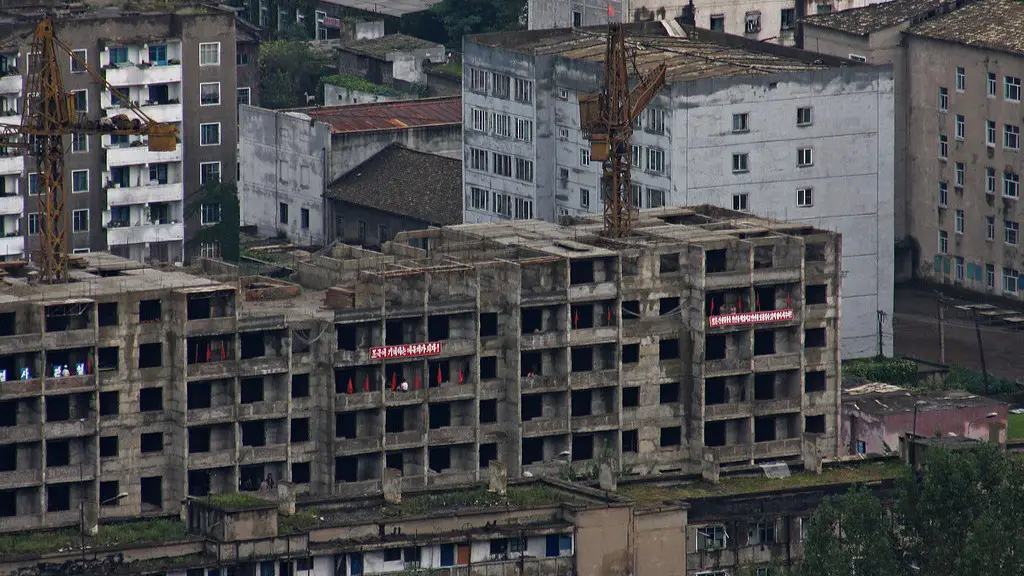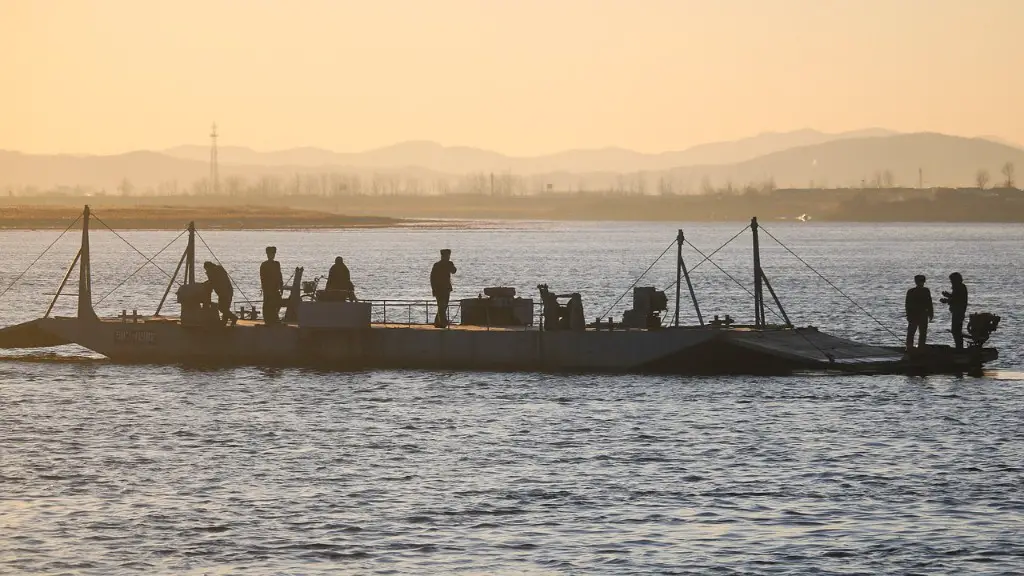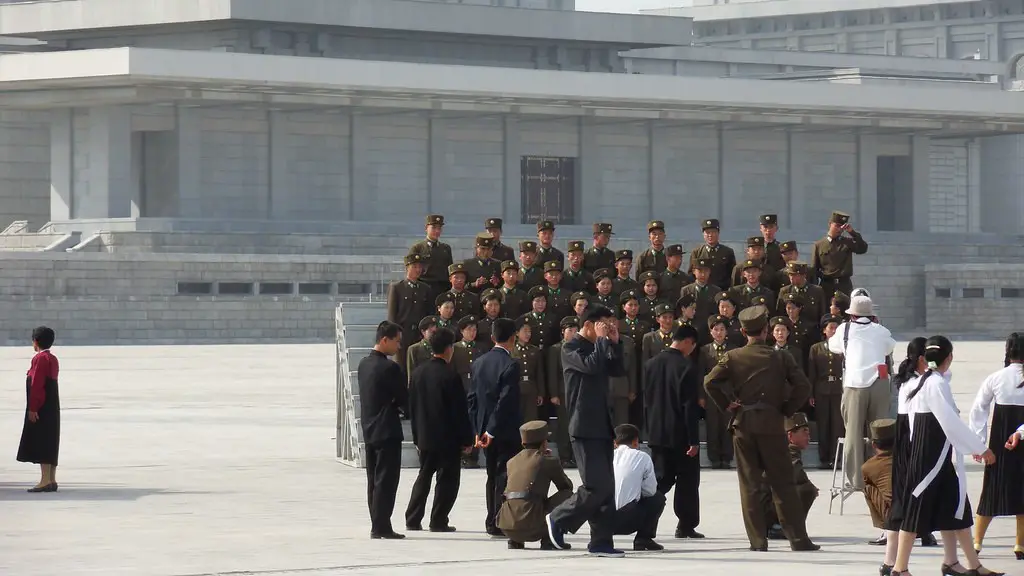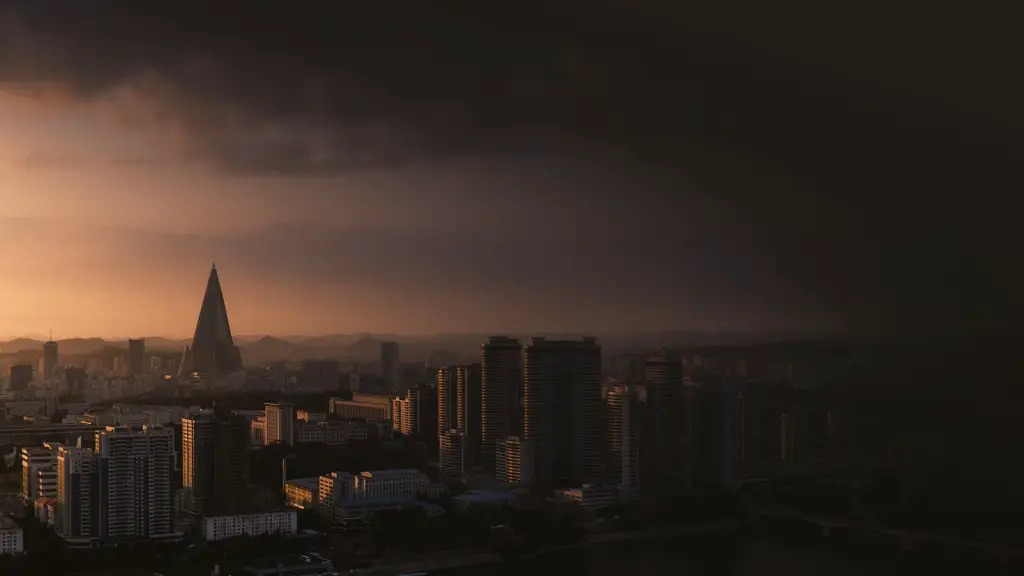North Korea, the world’s most isolated country, is renowned for its total lack of transparency and almost total absence from global news headlines. What many people don’t know, though, is that North Korea is actually one of the world’s poorest countries. In its attempt to become a self-sufficient closed economy, North Korea has cut itself off from global trade, investment and technological advancements – all essential to fuel economic growth.
According to the World Bank, North Korean has one of the lowest GDPs in the world, estimated to be just $33 billion. This is in stark contrast to its neighbour, South Korea, whose GDP is estimated to be $1.6 trillion, making it one of the richest countries in the world, with per capita income that is nearly 75 times higher than North Korean’s.
The UN’s Food and Agriculture organization estimates that North Korea experienced a severe food crisis from 1995-2001, with over 10 million people facing severe food shortages. This is due to a combination of factors, such as an inefficient public distribution system and widespread poverty. The situation has been compounded by the country’s lack of external resources, leading to its inability to import food and consumer products from abroad. Even today, millions of North Koreans continue to suffer from chronic and severe malnutrition.
Furthermore, North Korea has experienced a severe economic crisis and has extremely high unemployment levels. According to the World Bank, North Korea’s labour force stood at 24.5 million in 2017, with 11.2 million of those people being unemployed. This is in part due to the sanctions placed on the country by the international community, and the fact that many industries are state owned, leaving little scope for private investment.
Experts also believe that the regime’s lack of commitment to democratic reforms is one of the main contributing factors to the country’s poverty. North Korea has long championed a Socialist system, which gives preference to the state at the expense of their citizens. This has made it hard for citizens to acquire basic needs and amenities, and is one of the main reasons for North Korea’s economic decline.
Today, North Korea’s citizens remain amongst some of the poorest people in the world, with most living on less than $1 per day. The lack of economic freedom has meant that the majority of the population are unable to pursue their ambitions, leading to increasing levels of poverty throughout the country.
Discrimination and Human Rights in North Korea
Discrimination is rife in North Korea, with women facing particular challenges due to their gender. According to a report by the United Nations Human Rights Council, women in North Korea face extensive discrimination in several aspects of daily life, from access to education and employment, to access to health care and housing. Women also face discrimination in the job market, as most employers are reluctant to hire women due to the country’s one-child policy.
Likewise, anyone who is suspected to have a disability or any other type of physical ailment faces severe discrimination in North Korea. Such individuals are often persecuted and ostracized by the wider community and are often barred from accessing the country’s limited health care services.
These human rights violations have been highlighted in various reports throughout the years, with the UN Human Rights Council concluding that the severity of the violations in North Korea has reached unimagined levels. The report also noted that torture, disappearances and executions are common practices in North Korea and urged the country’s leaders to take immediate action to improve the situation.
The lack of accountability and transparency within North Korea is one of the main reasons why human rights violations remain unchecked. As a result, many individuals continue to suffer in silence, subjected to horrific abuse and deprivation of their basic human rights.
International Sanctions on North Korea
International sanctions on North Korea have further compounded the poverty situation in the country, as the country’s access to financial resources and technology has been severely restricted. The UN Security Council has imposed several rounds of sanctions on North Korea since 2006, in response to the country’s violation of international law and its continued development of nuclear weapons.
This has had a major impact on the economy, with a 2018 report by the Institute for International Humanitarian Law estimating that sanctions have cost North Korea $30 billion over the past 12 years. This has severely hampered the country’s ability to import food, medicine and other essential supplies, leading to further deterioration of the poverty levels in the country.
The sanctions have also had an impact on the country’s access to financial resources, as North Korean banks have been consistently denied access to the global financial system due to the sanctions. This has resulted in a severe shortage of funds available for investment and development, leading to a stagnation of the North Korean economy.
What is clear is that without a dramatic change in the country’s policy, or the removal of international sanctions, North Korea’s poverty situation is unlikely to improve in the near future.
North Korea’s Political System
The current political system in North Korea is dominated by the Communist Party of Korea, which acts as the de facto ruling party in the country. The party is led by Supreme Leader Kim Jong Un, who maintains absolute power over the country’s decision making process. This leaves little to no room for democratic reform and accountability, leading to a continuation of the country’s current economic and political system.
The Party is also responsible for all major infrastructure and economic projects, with most decisions and plans made by the Party’s leadership. This has resulted in an inefficient allocation of resources, with most of the country’s resources being funnelled into military and nuclear development, at the expense of social welfare, education and healthcare.
The current political system also encourages citizens to remain silent and remain loyal to the regime, as any protests, or expressions of dissent, can be met with severe punishment, or even death. This has had a devastating impact on the country, with citizens living in a climate of fear and oppression, leading to a culture of repression and conformity.
The Effect of Global Isolation
North Korea’s decision to become a self-sufficient closed economy has had disastrous effects, as the country has become increasingly isolated from the global economy, meaning that it is unable to benefit from global advances in science, technology and other areas. This has prevented the country from catching up to other countries in terms of economic and technological developments, leaving it severely lagging behind and vulnerable in a rapidly changing global economy.
Furthermore, North Korea’s isolation has severely hindered the country’s ability to attract foreign investment, as most investors view North Korea as a high-risk venture. This has resulted in a severe shortage of funds for investment and development, further compounding the country’s economic crisis.
The gnawing isolation of North Korea has been further worsened by the sanctions imposed by the international community, which have led to a dramatic decrease in the country’s access to external resources. What is certain, is that without complete access to the global economy, North Korea’s poverty situation is unlikely to improve anytime soon.
Conclusion
North Korea is one of the world’s poorest countries, and the only one facing a severe economic crisis. The country’s poverty is a result of multiple factors, from human rights violations, to economic mismanagement and international sanctions. What is certain is that, without drastic changes to the country’s current political and economic system, it is unlikely that North Korea’s poverty situation will improve soon.





